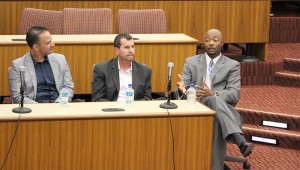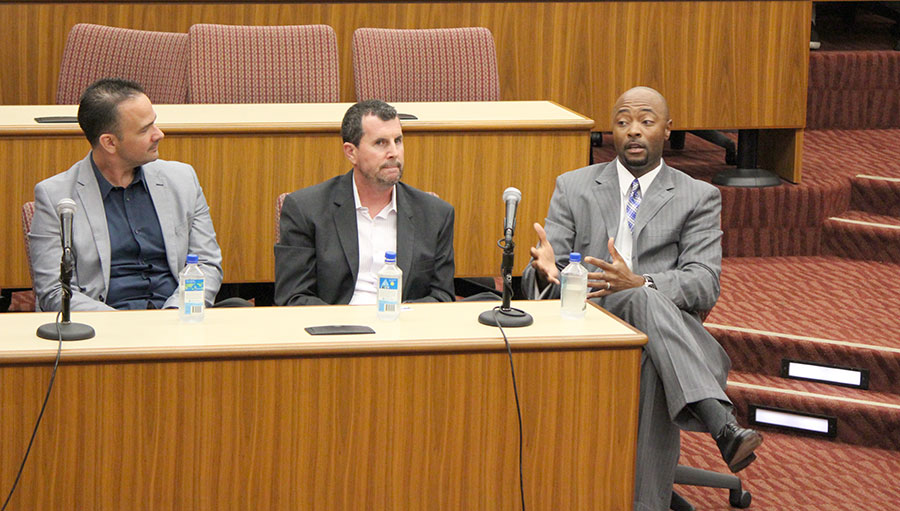Sports administrators speak at panel
The USC Sports Business Association hosted its annual fall panel Monday night in the Ronald Tutor Campus Center with Los Angeles sports industry leaders.

Break it down · Steven Esparza (left), Blaine Skinner (center) and Bobby Scales (right) joined a panel discussion Monday night. – Kevin Fohrer | Daily Trojan
The panel included Blain Skinner, executive director of corporate partnerships for the Los Angeles Lakers; Mark Madsen, assistant coach for the Los Angeles Lakers; Jonathan Lowe, vice president of marketing for the Los Angeles Kings and Anschutz Entertainment Group; Steven Esparza, assistant director of communications for the Los Angeles Clippers; and Bobby Scales, director of player development for the Los Angeles Angels.
“We chose a team panel this year because of the lure of these teams in the Los Angeles area, they are so well respected and have such rich history,” said Jake Kelfer, president of the Sports Business Association. Kelfer was in charge of coordinating the event.
The event began with an introduction to the panel by Annenberg Professor Jeff Fellenzer and an overview of what Fellenzer calls his “Four Ps”: passion, preparation, performance and persistence.
Lowe opened the spirited discussion by emphasizing that passion is a huge part of working in the sports industry and being successful.
“There is a difference between being a fan and working in the industry. You have to love what you do on a day-to-day basis and be passionate for the teams you work for and your product,” Lowe said.
The conversation quickly shifted to social media and its impact on the sports industry, particularly on players and fans. Skinner, who has spent 34 years with the Lakers and is a USC alumnus, spoke about this impact.
“Technology has taken what we do to another level, it really changed the game in terms of fan interaction,” Skinner said.
Scales then promoted his newly created Twitter account to the crowd and admitted he was not very active on social media but that it is a huge part of the clubhouse both in the minor and major leagues and promised to get more involved.
Madsen, a two-time NBA champion with the Lakers, recently completed his M.B.A. at Stanford. He spoke about how personal relationships helped him get to where he is today.
“I got my offer from Los Angeles due in large part to relationships I created along the way when I was in the NBA. You really never know when you’re being interviewed so you must always be auditioning and prepared,” he said.
When Fellenzer questioned the panel on crisis management from a sports standpoint, Esparza was quick to respond. He touched on the Donald Sterling controversy last year. Sterling, the former owner of the Clippers, was recorded on tape making racist comments about blacks.
“TMZ called us to tell us they had audio tapes of our then-owner saying horrible things; however, they wouldn’t tell us what they had,” he said. “When the tapes were released we obviously realized the magnitude of the situation, and it was a nightmare. The sponsors began to drop, as it became local, national and then global news. The toughest part was as it affected our players; our job is to make sure our players are shielded from distractions and this was obviously a huge challenge given the situation.”
Esparza and his colleague then came up with the “We Are One” slogan that caught on quickly amongst teams and players, and even the league.
He expressed optimism about new owner Steve Ballmer and the future of the franchise.
The event closed out with each of the panelists discussing advice to students as to how to make themselves more marketable towards sports different sports teams.
“USC has always had great foresight and great vision in bringing a lot of different types of people together from various aspects of any industry, it has a strong brand that translates well into the sports industry,” Madsen said.

